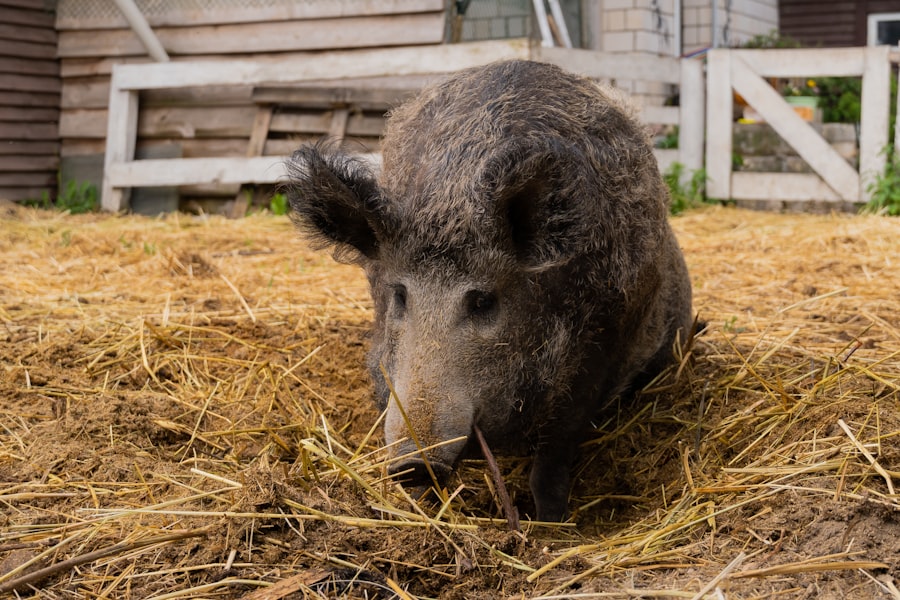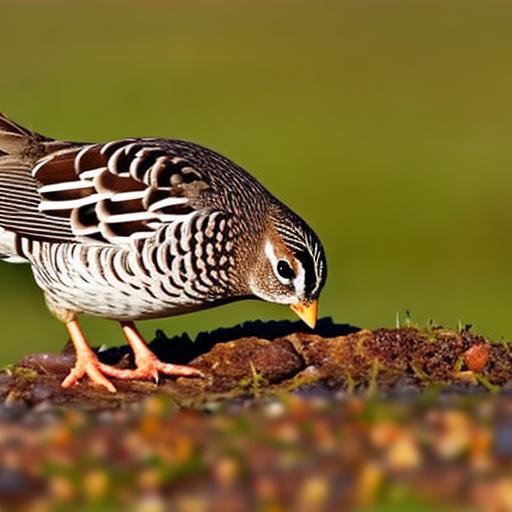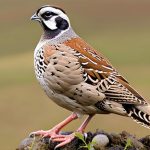When it comes to choosing the right quail breed for your needs, there are several factors to consider. First and foremost, you’ll want to think about the purpose of raising quails. If you’re looking to raise quails for their eggs, you may want to consider breeds such as Coturnix (also known as Japanese quail) or Bobwhite quail, as they are known for their prolific egg-laying abilities. If you’re interested in raising quails for meat, breeds like the Jumbo Coturnix or the Pharaoh quail may be more suitable due to their larger size and meatier bodies.
Another important factor to consider when choosing a quail breed is the climate in which you live. Some quail breeds are better suited to colder climates, while others thrive in warmer environments. For example, the Coturnix quail is known for its adaptability to various climates, making it a popular choice for many quail enthusiasts. On the other hand, breeds like the Bobwhite quail are better suited to warmer climates and may not fare as well in colder regions.
In addition to considering the purpose and climate, it’s also important to think about the availability of the quail breed in your area. Some breeds may be more readily available than others, and it’s important to choose a breed that you can easily obtain to start your quail-raising journey. Ultimately, the right quail breed for you will depend on your specific needs and circumstances, so it’s important to do thorough research and consider all of these factors before making a decision.
Key Takeaways
- Different quail breeds have different characteristics and purposes, so choose the breed that best fits your needs and environment.
- Provide a suitable habitat for quails with proper bedding, temperature control, and protection from predators.
- Feed quails a balanced diet of commercial quail feed, supplemented with fresh greens and clean water to keep them healthy.
- Handle quails gently and regularly check for signs of illness or injury to ensure their well-being.
- Collect quail eggs daily and store them in a cool, dry place to maintain freshness and quality.
- Prevent diseases by keeping the quail habitat clean, providing proper nutrition, and monitoring for any signs of illness.
- If breeding quails, ensure proper incubation conditions and care for the chicks once they hatch.
Setting Up a Quail Habitat
Setting up a suitable habitat for your quails is essential for their health and well-being. When it comes to housing quails, there are several options to consider, including cages, aviaries, or coops. The type of housing you choose will depend on the number of quails you plan to raise and the space available to you. Regardless of the type of housing you choose, it’s important to ensure that it provides adequate space for the quails to move around and engage in natural behaviors.
In addition to providing ample space, it’s important to consider the bedding and flooring of the quail habitat. Quails are ground-dwelling birds, so it’s important to provide them with a suitable substrate that allows them to scratch and dust bathe. Common bedding options for quails include straw, wood shavings, or sand. It’s important to regularly clean and replace the bedding to maintain a clean and healthy living environment for the quails.
Furthermore, it’s essential to provide appropriate shelter and protection from predators in the quail habitat. This can be achieved through the use of wire mesh or netting to enclose the habitat and protect the quails from potential threats. Additionally, providing adequate ventilation and natural light in the habitat is crucial for the overall health and well-being of the quails. By carefully considering these factors and providing a suitable habitat for your quails, you can ensure that they thrive in their environment.
Feeding and Watering Quails
Proper nutrition is essential for the health and productivity of quails. When it comes to feeding quails, it’s important to provide a balanced diet that meets their nutritional needs. A commercial game bird feed is a convenient option that provides the essential nutrients quails need for growth and egg production. Additionally, supplementing their diet with fresh greens, fruits, and vegetables can provide added vitamins and minerals to support their overall health.
In addition to providing a balanced diet, it’s important to ensure that quails have access to clean and fresh water at all times. Quails are small birds with high metabolic rates, so they require regular access to water to stay hydrated and healthy. It’s important to provide water in a way that prevents spillage and contamination, such as using nipple drinkers or shallow water dishes that are easy for the quails to access.
Furthermore, it’s important to monitor the feeding and drinking habits of your quails to ensure that they are consuming an adequate amount of food and water. Adjusting their diet as needed based on their activity levels and production can help maintain their health and productivity. By providing a balanced diet and ensuring access to clean water, you can support the overall well-being of your quails and promote optimal growth and egg production.
Handling and Caring for Quails
Proper handling and care are essential for maintaining the health and well-being of quails. When handling quails, it’s important to do so gently and calmly to minimize stress on the birds. Quails are small and delicate birds, so it’s important to handle them with care to avoid causing injury or distress. When picking up a quail, it’s best to approach them slowly and scoop them up from underneath to provide support and prevent them from flapping or struggling.
In addition to handling, it’s important to regularly monitor the health of your quails and provide any necessary care or treatment. This includes regularly checking for signs of illness or injury, such as changes in behavior, appearance, or egg production. If any issues are identified, it’s important to seek advice from a veterinarian or experienced quail keeper to address the problem promptly.
Furthermore, providing a clean and comfortable living environment is essential for caring for quails. This includes regularly cleaning their habitat, providing fresh bedding, and maintaining proper ventilation and temperature levels. Additionally, providing enrichment activities such as dust baths or perches can help keep quails mentally stimulated and physically active. By handling quails with care, monitoring their health, and providing a suitable living environment, you can ensure that they thrive under your care.
Collecting and Storing Quail Eggs
Collecting and storing quail eggs is an important aspect of raising quails for egg production. When collecting eggs from your quails, it’s important to do so regularly to prevent them from becoming dirty or damaged. Quails typically lay their eggs in the morning, so checking for eggs once or twice a day can help ensure that they are collected promptly.
When collecting eggs, it’s important to handle them gently to avoid cracking or breaking them. It’s best to hold the eggs carefully in your hand or use a soft container such as a basket or egg carton to transport them without causing damage. Additionally, it’s important to clean any soiled eggs before storing them by gently wiping them with a damp cloth or sponge.
Once collected, quail eggs should be stored in a cool and dry location away from direct sunlight. Storing them in an egg carton or egg tray with the pointed end down can help maintain their freshness and prevent them from spoiling. Quail eggs can typically be stored for up to 2 weeks at room temperature or up to 2 months in the refrigerator before they start to lose quality.
By following proper collection and storage practices, you can ensure that your quail eggs remain fresh and safe for consumption. Whether you plan to eat the eggs yourself or sell them to others, proper handling and storage are essential for maintaining their quality.
Health and Disease Prevention for Quails

Maintaining the health of your quails is essential for their overall well-being and productivity. One of the key aspects of health management is disease prevention. Preventing diseases in quails can be achieved through various measures such as biosecurity practices, vaccination programs, and regular health monitoring.
Implementing biosecurity measures is crucial for preventing the introduction and spread of diseases in your quail flock. This includes controlling access to your quail habitat, practicing good hygiene when handling birds or equipment, and preventing contact with wild birds or other potential disease carriers. By minimizing exposure to disease-causing agents, you can reduce the risk of illness in your quails.
In addition to biosecurity measures, vaccination programs can be an effective way to protect your quails from common diseases such as Newcastle disease or fowl pox. Consult with a veterinarian or poultry health professional to develop a vaccination schedule that is appropriate for your specific circumstances.
Regular health monitoring is also important for detecting any signs of illness or disease in your quails early on. This includes observing their behavior, appearance, egg production, and overall condition on a regular basis. If any issues are identified, it’s important to seek advice from a veterinarian or experienced poultry keeper to address the problem promptly.
By implementing biosecurity measures, vaccination programs, and regular health monitoring, you can help prevent diseases in your quail flock and maintain their overall health and productivity.
Breeding and Incubating Quail Eggs
Breeding and incubating quail eggs can be an exciting aspect of raising quails. When it comes to breeding quails, it’s important to provide suitable conditions for mating and egg laying. This includes ensuring that male-to-female ratios are appropriate for breeding purposes and providing suitable nesting areas for egg laying.
Once eggs have been laid, they can be collected for incubation if you wish to hatch them into chicks. Incubating quail eggs requires careful attention to temperature, humidity, and turning of the eggs throughout the incubation period. It’s important to use a reliable incubator that maintains stable temperature and humidity levels to ensure successful hatching.
During incubation, it’s important to regularly monitor the development of the embryos by candling the eggs. This involves shining a bright light through the egg to observe the growth and movement of the embryo inside. Candling can help identify any issues such as infertile eggs or development problems early on.
Once the incubation period is complete, hatching typically occurs within 17-18 days for most quail breeds. It’s important to provide suitable conditions for newly hatched chicks such as warmth, food, water, and protection from predators.
By carefully managing breeding activities and incubating eggs with proper care, you can successfully hatch healthy chicks from your quail eggs.
To start, it is important to select healthy, disease-free quail for breeding. Provide them with a balanced diet and a clean, stress-free environment to ensure optimal fertility and egg production. Collect the eggs daily and store them in a cool, humid place until you are ready to incubate them. When incubating the eggs, maintain the proper temperature and humidity levels, and turn the eggs regularly to prevent the embryos from sticking to the shell. Monitor the development of the embryos closely and be prepared to intervene if any issues arise. With careful attention to detail and proper management, you can increase the likelihood of successfully hatching healthy quail chicks from your eggs.
If you’re interested in learning about the fascinating world of poultry farming, you might also enjoy reading about the incubation period for goose eggs. This informative article from Poultry Wizard provides valuable insights into the breeding and hatching process of geese, offering a comprehensive guide for those looking to expand their knowledge beyond quail farming. Check out the article here to discover more about this aspect of poultry husbandry.
FAQs
What are quails?
Quails are small ground-dwelling birds that are often kept for their eggs and meat. They are known for their fast growth and high egg production.
What do quails eat?
Quails are omnivores and their diet consists of a variety of foods including seeds, insects, and small plants. They can be fed a commercial quail feed or a mixture of grains and protein sources.
How do I house quails?
Quails can be housed in a variety of structures including cages, hutches, or aviaries. It’s important to provide them with a clean and dry environment with proper ventilation.
How do I care for quails?
Quails require regular access to clean water, a balanced diet, and protection from predators. They also need regular cleaning of their living space to prevent disease and maintain their health.
How do I collect quail eggs?
Quail eggs can be collected daily from the nesting area. It’s important to handle the eggs gently and store them in a cool, dry place.
How long do quails live?
Quails typically live for 2-5 years, depending on their breed and the level of care they receive.
Meet Walter, the feathered-friend fanatic of Florida! Nestled in the sunshine state, Walter struts through life with his feathered companions, clucking his way to happiness. With a coop that’s fancier than a five-star hotel, he’s the Don Juan of the chicken world. When he’s not teaching his hens to do the cha-cha, you’ll find him in a heated debate with his prized rooster, Sir Clucks-a-Lot. Walter’s poultry passion is no yolk; he’s the sunny-side-up guy you never knew you needed in your flock of friends!







